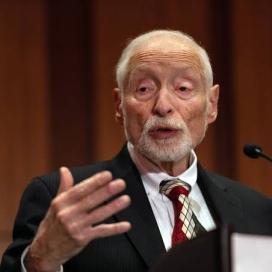Edgar
Cahn
Nominated by Julie Anne Reiskin
Edgar S. Cahn, a stalwart champion of justice and co-founder of the Antioch School of Law, predecessor to the UDC David A. Clarke School of Law, left a unforgettable mark on the landscape of access to justice. Born in Manhattan on March 23, 1935, to parents deeply entrenched in advocacy, Edgar's early life hinted at his future path, characterized by a blend of mischief and virtue. His journey began with academic pursuits, culminating in degrees from Swarthmore College, Yale University, and Yale Law School. It was his tenure as Special Assistant to Attorney General Robert Kennedy that set the stage for his enduring commitment to systemic change. Through Kennedy's address at the University of Chicago in 1964, Cahn's progressive ideals found expression, advocating for shifts beyond traditional legal paradigms toward societal transformation.
The pivotal year of 1964 saw Cahn's collaboration with Robert Sargent Shriver, Jr., in establishing the National Legal Services program, a seminal moment in the evolution of legal aid in the United States. Their work laid the groundwork for the creation of the Legal Services Corporation, a testament to Cahn's capacity to effectuate large-scale change. His tireless advocacy extended to combating hunger, with initiatives such as the Citizens’ Board of Inquiry into Hunger and Malnutrition in America.
In 1972, alongside his wife Jean Camper Cahn, Edgar founded the Antioch School of Law, embodying their shared vision of public interest legal education. Despite financial adversity, their perseverance led to the school's reincarnation as the District of Columbia School of Law, later becoming the David A. Clarke School of Law. Their commitment to clinical education set a precedent for legal training nationwide, catalyzing real-world impact through student engagement.
The hallmark of Cahn's legacy lies in his pioneering concept of timebanking, a radical reimagining of currency based on reciprocal service. This innovative approach sought to empower marginalized communities by recognizing the inherent value of their time and contributions. Alongside his wife Christine Gray, Cahn propagated timebanking initiatives globally, advocating for its integration into socio-economic systems. His unwavering belief in the inherent dignity of every individual fueled his efforts to reshape legal frameworks, epitomized in his teaching and research at UDC Law.
Cahn's influence extended beyond academia, as evidenced by his instrumental role in establishing the Time Dollar Youth Court, a pioneering juvenile diversion program. From the Charles J. Ogletree, Jr. Champions of Justice Award to the William Pincus Clinical Award, Cahn's impact reverberated across legal and humanitarian spheres.
In his own words, Cahn encapsulated his ethos: "You can get anything done as long as you don't care who gets the credit." His humility belied the profound legacy he forged, forever altering the trajectory of access to justice.

